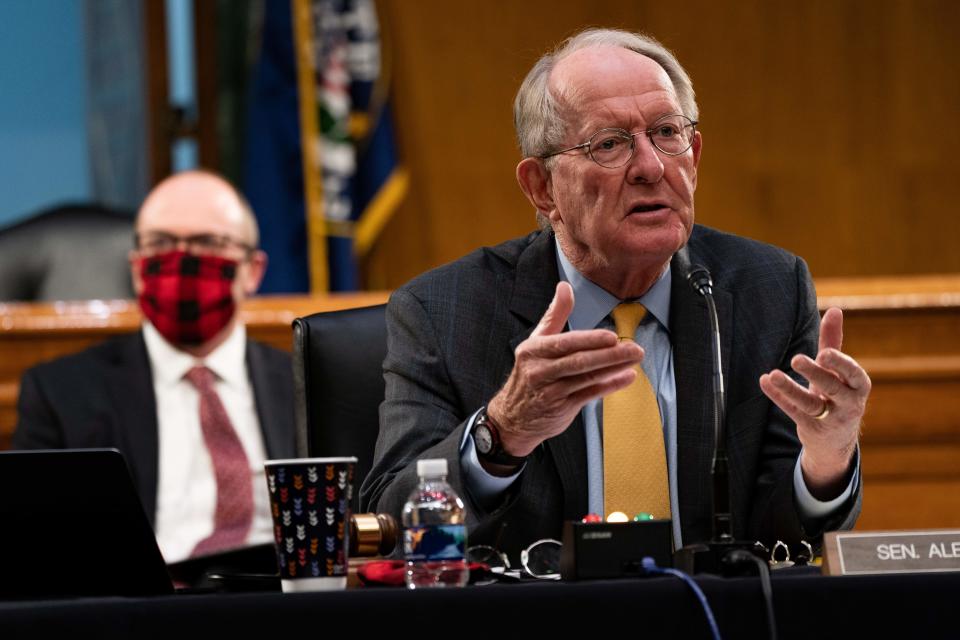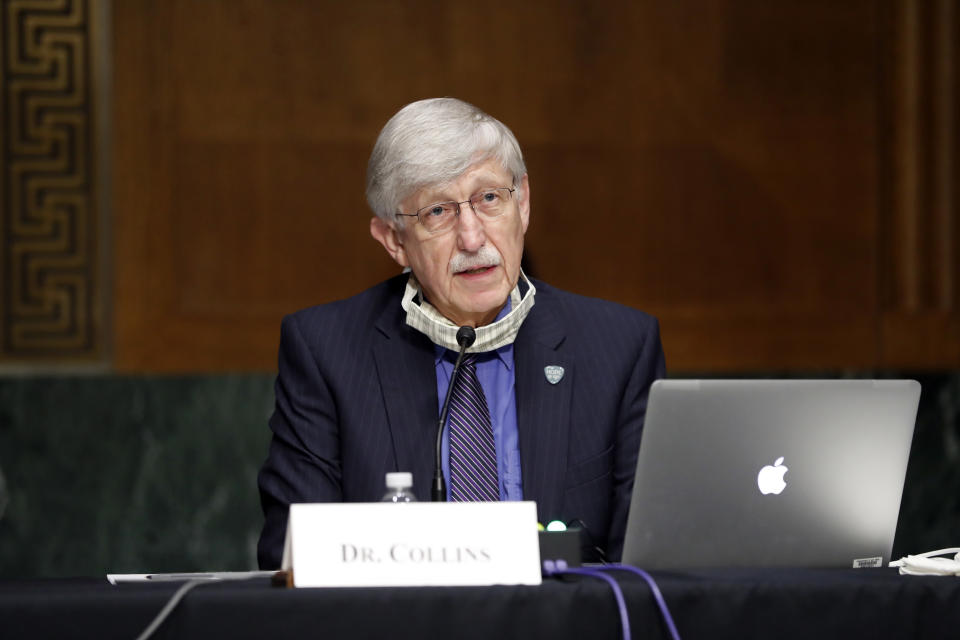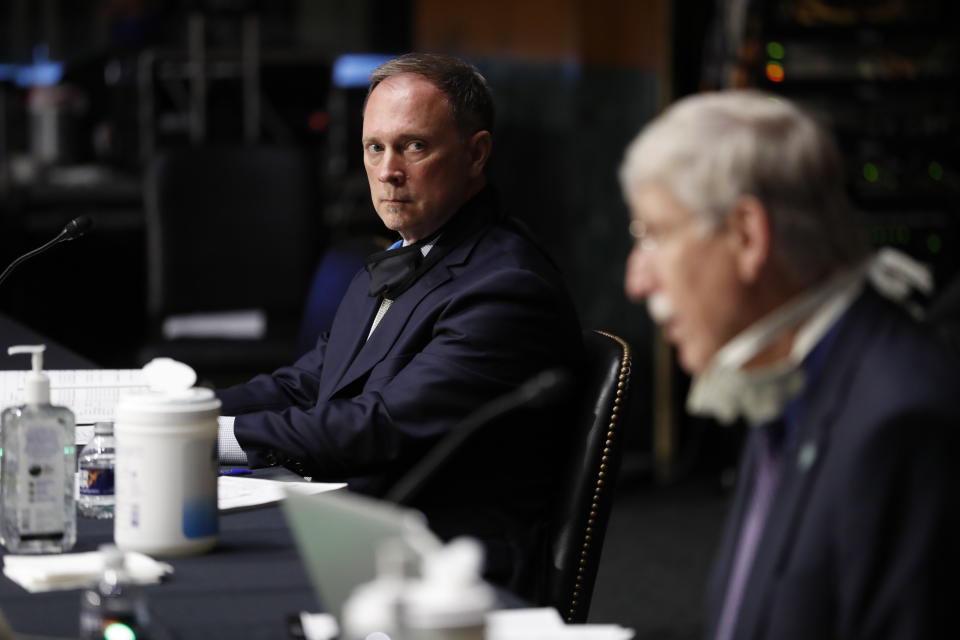Republican breaks with Trump, calls for 'tens of millions' of coronavirus tests
WASHINGTON — Breaking with the leader of his own party, Sen. Lamar Alexander, R-Tenn., called Thursday for “tens of millions” of diagnostic coronavirus tests to be administered to Americans before the country can begin to return to normal.
Those comments came a day after President Trump downplayed diagnostic testing as part of its post-pandemic reopening. “By doing all of this testing, we make ourselves look bad,” Trump said on Wednesday.
It was not clear if Alexander would want those millions of tests to be deployed daily or weekly, though the latter seemed to be the case. Either would be a drastic improvement over the current state of affairs. The U.S. currently administers about 200,000 tests per day, an insignificant number in a nation of 328 million.

But it is impossible to administer tests that do not exist. Those “tens of millions of tests” he deemed necessary, Alexander acknowledged, amount to “many more than our current technologies can produce.”
A former governor of Tennessee, Alexander appeared to break with Republican governors in Texas, Florida and Georgia who have begun to open up their states without having tested statistically significant portions of their populations.
“All the roads back to work, and back to school, lead through testing,” Alexander, the Senate Health Committee chairman, said during a hearing of the committee that was intended to promote the development of new testing technologies.
So far, 7,759,771 tests for the coronavirus have been conducted across the United States, according to the COVID Tracking Project, a public data clearinghouse. But because multiple tests are administered to those infected with the virus, the number of people who have been tested is far lower than that.
About 75,000 Americans have died from complications related to COVID-19, the lung disease caused by the coronavirus.
Although a reliable conservative, Alexander has never been a close ally of the president, and his planned retirement at year’s end leaves him free to speak without fearing the consequences of a presidential tweet.
“We will need millions more tests than we are producing today,” Alexander asserted at one point. Members of his staff did not respond to a request for details, but the ambitious proposal is not entirely unprecedented. A recent Harvard study said that to reopen safely, the United States needs to test 20 million people per day. That would be 14 times greater than what Alexander appeared to be advocating, which in itself would be a major increase over current testing capacity.
His remarks pushing for a significant increase in the nation’s testing capacity came during a hearing called “Shark Tank: New Tests for COVID-19.” The reference is to “Shark Tank,” a popular television program in which entrepreneurs pitch their ideas to a panel of skeptical celebrity investors.
A similar shark tank project is now underway in the federal government for coronavirus testing. Called the Rapid Acceleration of Diagnostics initiative, or RADx, it invites private companies to submit their own ideas for new coronavirus tests. Dr. Francis Collins, who directs the National Institutes of Health, testified before Alexander’s panel that the initial call for submissions last month resulted in 1,087 proposals filed with the NIH.

Those companies seek to receive some of the $1.5 billion allocated for this project from federal coronavirus relief funds. The idea was initially proposed by Alexander and Sen. Roy Blunt, R-Mo. “If there’s a bold idea out there that will work, we need to make sure the funding is available to get it approved and in the hands of health-care providers quickly,” they wrote.
Speaking on Thursday, Alexander compared the testing initiative to the Manhattan Project, which resulted in the development of the atomic bomb during World War II. One of the key facilities in that effort was based in Alexander’s home state, at Oak Ridge, Tenn. (The Manhattan Project amounted to an investment of what would today be more than $20 billion.)
Alexander called RADx “one of the most ambitious scientific enterprises in recent memory.” It is being managed by NIH and the Biomedical Advanced Research and Development Authority, whose director, Dr. Rick Bright, was recently demoted for refusing to endorse a dubious coronavirus treatment that had been touted by Trump and some of his supporters in the conservative media.
Bright’s replacement, Dr. Gary Disbrow, was present at Thursday’s hearing, but refused to answer questions related to Bright’s dismissal posed by Sen. Patty Murray of Washington state and Christopher Murphy of Connecticut, both of whom are Democrats.
Disbrow did want to talk about the kinds of tests RADx might yield, including ones that can detect the virus in saliva, thus obviating the need for invasive nasal swabs. Trump underwent such a test in March and has complained about the procedure. “Up your nose and then we hang a right, and it goes down here,” the president said of that procedure. “And then we’ll wiggle it around here, under your eye.”

Disbrow and Collins envisioned quick, easy-to-administer tests, with results available on smartphones. It was not clear whether such coronavirus tests had already been proposed through the RADx shark tank process.
Trump’s skepticism about testing is shared by some members of the White House coronavirus task force, including the very official placed in charge of the testing issue. “There is absolutely no way on earth, on this planet or any other planet, that we can do 20 million tests a day, or even 5 million tests a day,” that official, Rear Adm. Brett Giroir, said late last month.
That was one of many confusing and contradictory assertions made by administration officials since the pandemic arrived in the United States about four months ago. Though they have routinely promised to drastically increase the number of people tested, those promises have been frustrated by logistical challenges the White House has been incapable of resolving.
Murphy, a progressive, has long criticized the Trump administration for its dilatory coronavirus response. And though he seemed to welcome the RADx initiative, he was disturbed by its timing. “If we had a president who truly prioritized testing, this effort would have been launched the minute that we heard about the prospect for coronavirus coming to the United States,” Murphy said.
Trump allegedly received that first warning on Jan. 3.
Cover thumbnail photo: Andrew Harnik/Getty Images
_____
Click here for the latest coronavirus news and updates. According to experts, people over 60 and those who are immunocompromised continue to be the most at risk. If you have questions, please refer to the CDC’s and WHO’s resource guides.
Read more:



